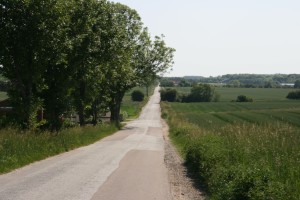Podcast: Defining easement
In this podcast, Rob Dickson explains the basic definition of an easement.


In this podcast, Rob Dickson explains the basic definition of an easement.
It is almost always the case, that a servient estate holder cannot unilaterally move an easement located on his property.
What if the use of the easement is far smaller than the area provided? For example, suppose an easement was created which was 100 feet wide, but the roadway providing the ingress/egress to the dominant estate holder was only 25 feet wide? What if the placement of the road was such that using the balance of 75 feet was impossible? Since the dominant estate holder’s access could remain the same if the 25 feet was located on a any section of the 100 foot easement, should the servient estate holder be able to shift the road to a different portion of the easement?
There is no clear answer to this question, as Washington State courts have not dealt with this particular issue. They have held that “where a right of way is established by reservation, the land remains the property of the owner of the servient estate and he is entitled to sue it for any purpose that does not interfere with the proper enjoyment of the easement.” Thompson v. Smith, 59 Wn.2d 397, 408 (1962). In Thompson, there existed an road on an easement which only used one half of the easement. The balance of the easement was unused, so the servient estate holder built a concrete slab extending into the easement. This was found to be within his rights as a property owner because the placement of the slab did not ultimately interfere with the use of the easement. This is not the same as having a road and moving it unilaterally, however.
In an analogous case, Crisp v. VanLaecken, 130 Wn.App. 320, 324 (1960), the court held that the servient estate holder could not make “reasonable changes in the location or dimensions of an easement . . . to permit normal use or development of the servient estate.” This held, even thoughthe easement itself would not have been harmed.
There is more precedent which mirrors Crisp, essentially favoring uniformity, stability, and predictability in property rights. So, even though there is not a case on point as to whether a road within an easement can be shifted, courts in Washington like to err on the side of stability/predictability in property rights. It is almost as though the road within an easement is another easement within an easement.
Recently, an interesting issue developed over the applicability of Washington State’s statute regarding waste caused to an easement. 
The facts are fairly straightforward: an individual owned property burdened by an easement for ingress/egress, which benefited his neighbors. The actual road was considerably smaller than the easement area provided and was located in a rural section of Washington. A dispute arose when he shifted the road to a section of the easement which would allow him expanded use of the remaining unused portion of the property. Needless to say, the road was significantly impacted by this conduct, such that the court required him to replace the road to the prior location (which was essentially running down the center of the easement). To that end, the neighbors expended a significant amount of attorney’s fees. In order to recoup their expenses, they invoked RCW 4.24.630 (Washington’s waste statute) which states that if you wrongfully go onto the land of another and cause injury to the property, you are eligible to recover treble damages, PLUS attorneys fees and costs.
The tripwire for invoking this law is that it is contingent on a form of trespass. Recovery for damage to an easement is different (and impossible, most would say) because if the easement is on the trespasser’s property, then it is virtually impossible to “go onto the land of another” since by definition an easement still remains the property of the burdened estate. Though there is not a wealth of authority in Washington which supports this, however there is a key decision in Colwell v. Etzel, 119 Wn. App. 432, 81 P.3d 895 (2003) where an appeals court criticizes the trial court’s interpretation of RCW 4.24.630. In that case, the trial court said that the statute did not mean that somehad had to physically enter on the land of another, but that trespassing was satifised if someone’s “interest in land” harmed or interfered with. The appeals court dissagreed, saying that the statute is clearly worded, and requires that there be an actual physical trespass before it can be utilzed to recover fees and treble damages. There are other decisions which support this, but they are unpublished (espcially a 9th Cirucuit case — Ehlers v. ConocoPhillips).
There is also the aspect of the law itself in that it is considered punitive by the court. As such, it MUST be construed narrowly. The end result is that there is simply not enough room left for interpretation and the law must be read to mean what it says…only going onto the land of another will trigger RCW 4.24.630. Consequently, if you go onto an easement located on your property and cause damage to it, you may be liable for the damage, but you are NOT liable for attorney’s fees and treble damages under RCW 4.24.630.